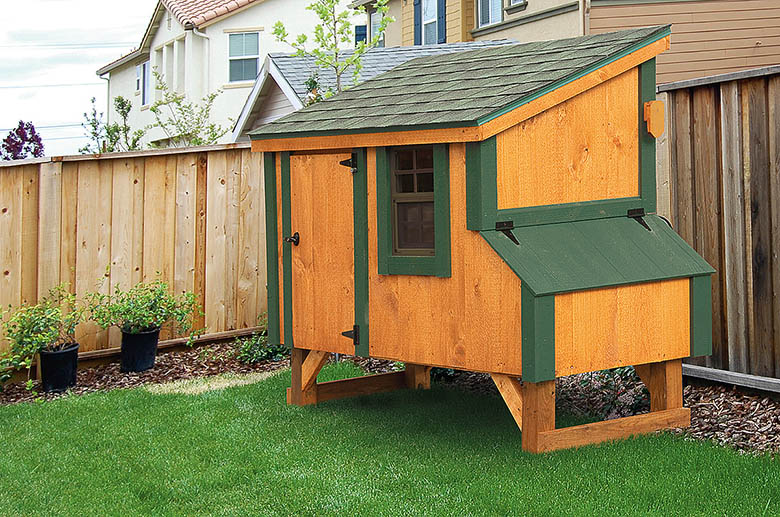Originally posted on Porch.com
Raising and owning chickens in the city brings a slice of country living to your home. Eggs fresh from the hen house are healthier and tastier than store-bought, and you get the satisfaction of knowing you farmed them yourself. Chicken litter—the spilled feed, shed feathers, chicken poop, and organic bedding that collects in the coop—is an excellent garden fertilizer and a great addition to your compost. Chickens are very affectionate and make wonderful pets—and they’re more than happy to eat up those pesky insects in your backyard. If you’re new to the world of urban backyard farming, use this basic guide as a jumping-off point to decide if raising chickens is right for you.
Do You Have What it Takes to Raise Chickens?
Before you get too deep into the nuts and bolts of urban chicken farming, make sure you have the answers to these important questions:
Does Your City Allow Chickens?
Being a renegade farmer might be a path for some, but for the rest of us law-abiders, it’s important to check with your city’s health or zoning boards to see if it’s legal for you to own chickens. Some states require a permit or charge a fee for urban farming, and certain restrictions may govern coop size and placement. Most cities that allow backyard chickens have ordinances in place that you’ll need to follow. There are usually limits to how many chickens you’re allowed to have, and many cities have laws against owning roosters due to their noisy nature.
Do You Have Enough Space?
Chickens don’t take up a ton of space, but you’ll want to make sure you’ve got a hearty enough swath of land for a chicken coop and plenty of room for your hens to graze. If your flock doesn’t have enough space to roam, things can get dark quickly—increased anxiety, obsessive pecking, etc. For the coop itself, the rule of thumb is three square feet per chicken—three chickens will require a nine-square-foot coop. Each chicken needs at least 15 square feet of space outside the coop to roam on. More space is better if you’ve got it, but as long as you meet these basic requirements, your chickens will be happy, healthy, and provide you with an abundance of delicious eggs.
Can You Afford to Raise Chickens?
Raising chickens isn’t all that expensive once you get going, but you’ll have to spring for the up-front costs—the most expensive being the chicken coop, which can run anywhere from $100 to $5000, depending on how elaborate you want to get. Chicken feed costs around $25 for a 50-pound bag, which will feed three to four chickens for a month. Organic feed costs a little more. Chicks are just a few dollars each, and run-of-the-mill, egg-laying hens cost around $20 apiece. Fancier breeds, like Brahmas and Orpingtons, are more expensive.
Are You Committed to the Work it Takes?
Chickens require regular care and attention. Daily maintenance tasks include feeding, providing clean water, and collecting those beautiful, freshly laid eggs. Monthly maintenance includes deep-cleaning water containers, freshening nest boxes, free and changing the bedding. If you travel, you’ll need to find someone to care for your chickens while you’re away—payment in farm-fresh eggs should be plenty of incentive to get a friend to take over chicken-sitting duties! Keep in mind that owning chickens is a long-term commitment of time, money, and caregiving. If you decide raising chickens isn’t for you, you’ll need to find a new home for your birds.
Planning Your Backyard Chicken Community
Now that you know the basic requirements for raising chickens, here’s the basic lowdown on coops and birds.
DIY vs. Store-Bought Chicken Coops
Do you want to build your own chicken coop, or buy one? A DIY chicken coop is a fun project for those with some building know-how and a free weekend. You can find chicken coop blueprints on the internet in more shapes and sizes than you can shake a stick at. A major advantage to building your own chicken coop is that it’s generally about half the cost of buying one, and you can get creative with it. If DIY-ing a chicken coop isn’t for you, you can find just what you’re looking for online or at your local farm supplies retailer.
Take a look at Horizon Structures’s PRE-BUILT chicken coops and requests a price list and catalog HERE.
Different Types of Chickens
Chickens come in numerous breeds. Some lay more eggs than others, some are friendlier than others, and some eat more than others. Once you become experienced with raising chickens, you can branch out and consider a wide variety of breeds with unique traits. But in the beginning, it’s a good idea to start with one of the easier, more standard breeds. Try one of these popular chickens:
- Golden Comet: The Golden Comet is a common hybrid that’s been bred to eat a small amount of food while laying around 280 eggs a year.
- Rhode Island Red: These rust-colored chickens can be raised for eggs or meat. They’re a strong breed and lay around 250 brown eggs each year.
- Sussex: Sussex is a calm, friendly breed that won’t destroy your garden and will lay around 250 eggs a year, ranging in color from brown to cream.
- Plymouth Rock: These large chickens are easily tamed and lay eggs every couple of days—about 200 a year, mostly small-to-medium in size and light brown in color.
- Easter Eggers: This hybrid breed lays around 250 gorgeous blue eggs each year. They’re a little more nervous than the above breeds and may not be as easy to cuddle.
How Many Chickens Should You Start With?
Chickens are social creatures and can literally die of loneliness, so plan on buying at least two birds. Some cities allow 25 chickens per flock, while other cities cap it at five. Check with your city’s ordinances to see how many birds you can buy. Then, decide how many you actually want—a good laying hen will produce around six eggs a week, so if you only need enough fresh eggs for your family, start with two or three hens.
If you’re planning to sell eggs to your community, you’ll need a bigger flock. But unless you farm chickens on a somewhat large scale, it’s a possibility that you won’t break even every month—so unless you find raising them enjoyable and rewarding, it’s probably not the best way to try to make a profit.
Larger broods will require more space, a larger coop, more time and money than a smaller flock. If you’re not sure where your chicken-raising will lead you, it’s a good idea to start with just a pair of hens and work your way up.
Raising your own chickens in the city promotes sustainability and healthy living, and it provides you with healthy food, delightful feathered friendships, and a lot of personal satisfaction. So go forth and get yourself some chickens, and create the backyard farm of your dreams.















